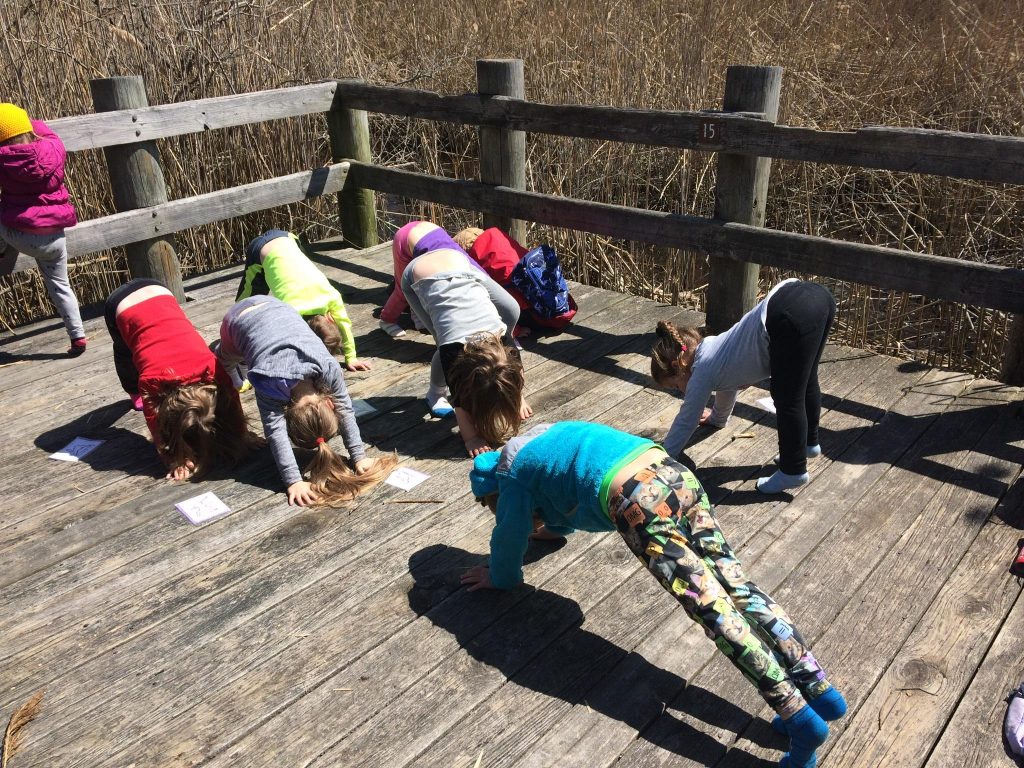Bundled up to protect from the cold weather, six screaming preschool children ran outside to look for sticks to build a tower.
“I found something!” a young girl’s voice cried out from a wooded area. She held a plastic fork in her mittened hand.
“Oh, that’s litter,” her teacher responded. “We don’t want to leave that, do we?”
Little Peeper’s Forest School is a half-day preschool held entirely outside. It’s the only program of its kind in Suffolk County. Each day, the children learn something new based on the environment around them. The kids learn to pick up trash they see, to take sticks only off the ground and to respect the world they live in.
In the past two decades, forest schools, or outdoor schools focused on nature-based learning, have gained popularity as a response to stricter school curricula. The concept is based off of ideas from European philosophers and educators. In Scandinavia, “friluftsliv,” or open-air living, was popularized in the 1850s by playwright Henrik Ibsen, who used the term to “describe the value of spending time in remote locations for spiritual and physical well-being,” according to BBC. This idea of open-air living has since gained popularity and now permeates the lifestyle in Scandinavia, including in schools. This idea is used in forest schools across the world.
Peter Walsh and Amanda Johnson both work for Seatuck Environmental Association, based in Islip, New York. Seatuck aims to promote “the conservation of Long Island’s wildlife and environment,” according to their website.
Fifteen years ago, Walsh and Johnson started to notice that children weren’t spending as much time outside as they used to and wondered what they could do to help. They decided to devise an after-school program for kids to play in nature. Five years ago, they started Little Peepers, a division of Seatuck, and a preschool program for children ages three to five. Walsh serves as the education director and Johnson is one of the lead teachers.
“Such an important part of living in this world is being comfortable in nature and enjoying it,” Johnson said. “Our program really encourages children to do that more. And not only the children, but the parents also.”
Students learn their colors by looking at the trees and leaves. They learn about weather, read books, do crafts and learn about environmental stewardship. Recently, they’ve been monitoring a dead raccoon they found off one of the trails and watching it decompose.

As a parent of a child in Little Peepers, Noelle Lewandowski said she has seen an immense improvement in her son Ellis’ social skills.
“He was very shy,” she said. “He comes home and tells me the coolest things, and he’ll tell everyone about it. He used to never speak to anyone. He wouldn’t even look at you.”
If Lewandowski had brought him to a more traditional preschool program, she thinks he wouldn’t have made such vast improvements.
“His confidence has just boosted,” she said. “To me, it’s 100 percent from this school.”
Studies have shown that increased time in nature can boost both physical and mental health.
According to an article in Parks & Recreation, “Having trees outside classroom windows can improve attention and test scores. Curricula that integrate the environment in meaningful ways also do this to an even greater degree, especially among students from low socioeconomic and minority backgrounds.” The article also cited a study from NC State University, which found that children who “go outside during class are more likely to have pro-environmental attitudes and behaviors.”
Johnson has been teaching for 25 years. Before helping start Little Peepers, she worked in more traditional classrooms. She said she has seen the children at Little Peepers change and grow more within a school year than she has in other schools.
“The kids are helping each other,” she said. “They really care for not only their friends, but the animals they see every day and the land that they’re on. They really develop that at a young age.”

Walsh said he hopes that Long Islanders will recognize the importance of nature. When the time comes for a vote on policy, he wants residents to understand why the issues matter. By educating kids early, Walsh and Johnson can help them grow up to be well-informed adults.
“We’re hoping to change a generation,” Johnson said, and laughed.




Comments are closed.